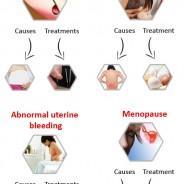
Summary
Women are susceptible to variety of health concerns that includes menstrual problems, pregnancy and menopause. They also face the risk of osteoporosis and urinary problems. This post will help you find out what you need to know about the common women health conditions, related causes and the treatments to counter those problems.
Menstrual problems
These are the kind of problems that women have during their periods.
(A) Amenorrhea
This term describes the absence of menstrual period in women.
Causes
- Pregnancy
- Breastfeeding
- Extreme weight loss caused by serious illness
- Eating disorders
- Excessive exercising
- Stress
- Hormonal problems (involving the pituitary, thyroid, ovary, or adrenal glands)
- Problems with the reproductive organs may be involved
(B) Dysmenorrhea
This is the term used to describe the painful periods, including severe menstrual cramps.
Causes
- In younger women, there is often no known disease or condition associated with the pain. A hormone called prostaglandin is responsible for the symptoms.
- Sometimes a disease or condition, such as uterine fibroids or endometriosis, causes the pain. Endometriosis is a female health disorder that occurs when cells from the lining of the womb (uterus) grow in other areas of the body. This can lead to pain, irregular bleeding, and problems getting pregnant (infertility).
Treatment
Some pain medicines available over the counter, such as ibuprofen, can help with these symptoms. Treatment depends on what is causing the problem and how severe it is.
(C) Abnormal uterine bleeding
- This is a very heavy vaginal bleeding that is different from normal menstrual periods.
- It is accompanied by unusually long periods (also called menorrhagia),
- Its general symptom may be period too close together
- Its symptom may be bleeding between periods.
Causes
- In adolescents and women approaching menopause, hormone imbalance problems often cause menorrhagia along with irregular cycles. Sometimes this is called dysfunctional uterine bleeding (DUB).
- Uterine fibroids
- Polyps.
Menopause
Menopause is the condition in women when she stops getting menstrual periods. This is a natural condition which onsets at around the age of 50 but it might happen in some cases as early as at the age of 40.
Causes
Women ovaries stops producing the hormones estrogen and progesterone. After getting the menopause, the women could not get pregnant anymore.
Pre Menopause
This is time leading to women last periods. During the time of the menopausal transition or pre menopause, the menstrual periods can stop for a while and then start again.
Post menopause
If the women does not get the periods for a stretch of one year in continuous then she have the menopause. After getting through menopause, women get into the post-menopausal stage of your life. The female hormones won’t go up and down the way they used to with your periods. They will stay at very low levels.
Treatment
Usually menopause is natural, hence no medical treatment is needed to cure this unless there is some symptom that bothers you.

Common Women Health Issues, Symptoms & Treatments
Osteoporosis
Osteoporosis is a disease of the bones. People with osteoporosis have bones that are weak and break easily. A broken bone can affect your life. It can cause severe pain and disability. It can make it harder to do daily tasks on your own, such as walking.
Osteoporosis affects all bones in the body. However, breaks are most common in the hip, wrist, and spine, also called vertebrae. Vertebrae support your body, helping you to stand and sit up.
Prevention
- Get enough calcium every day
- Get enough vitamin D every day
- Balanced and healthy diet
- Don’t drink or smoke
- Get moving
- Prevent bone loss through medication
- Make home safe
Preliminary test
Dual-energy X-ray absorptiometry or DXA scan takes X-rays of bones. Screening tools also can be used to predict the risk of having low bone density or breaking a bone.
Treatment
Bisphosphonates
Bisphosphonates drugs in this group also can treat bone loss, and in some cases, can help build bone mass.
SERMs
A class of drugs called estrogen agonists/antagonists, commonly referred to as selective estrogen receptor modulators (SERMs) help slow the rate of bone loss.
Calcitonin
Calcitonin is a naturally occurring hormone that can help slow the rate of bone loss.
Menopausal hormone therapy (MHT)
These drugs, which are used to treat menopausal symptoms, also are used to prevent bone loss. But recent studies suggest that this might not be a good option for many women.
Parathyroid hormone or teriparatide
Teriparatide is an injectable form of human parathyroid hormone. It helps the body build up new bone faster than the old bone is broken down.
